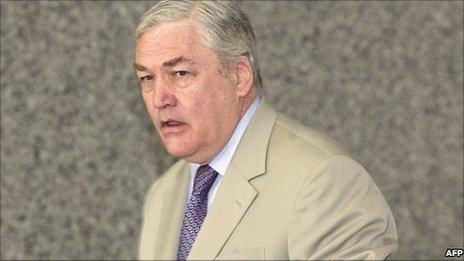Timeline: Lord Black on trial
- Published

Conrad Black was given a six-and-a-half year jail term in 2007 but was resentenced in 2011
A guide to the life and times of Conrad Black, the media mogul and former Daily Telegraph owner who has been found guilty in the US of fraud and obstruction of justice.
1944 - Born Conrad Moffat Black in Montreal, Canada.
1966 - Buys his first newspaper, the Eastern Townships Advertiser in Quebec.
1986 - Takes over The Daily Telegraph.
1992 - Marries his second wife, Canadian journalist Barbara Amiel.
1996 - Hollinger International, his holding company, listed on the New York Stock Exchange.
2001- Ennobled as Lord Black of Crossharbour after giving up his Canadian citizenship.
June 2003 - Agrees to an internal investigation into payments to himself and other Hollinger directors.
November 2003 - Investigation is completed. Lord Black resigns as chief executive of Hollinger International.
January 2004 - Hollinger International sues him for return of $200m (£99m) in alleged unauthorised payments and sacks him as chairman. He counter-sues for defamation.
The Barclay Brothers agree a $466.5m deal with Lord Black to buy his controlling stake of Hollinger Inc, Hollinger International's parent firm.
February 2004 - US court injunction blocks Lord Black from selling his stake.
May 2004 - Hollinger International accuses Lord Black and its former president David Radler of fraud, now claiming they stole more $1.2bn.
June 2004 - Telegraph titles sold to the Barclay brothers for £665m. Lord Black steps down from board of Hollinger International.
September 2004 - Canadian regulators and Hollinger investors file lawsuit against Lord Black and the company.
October 2004 - US court clears Lord Black of $1.2bn racketeering suit brought by Hollinger International.
November 2004 - SEC files civil fraud charges against Lord Black and David Radler. Lord Black resigns as chairman and chief executive at Hollinger Inc.
September 2005 - David Radler pleads guilty and agrees to testify against others involved in the alleged $60m (£29.5m) fraud.
November 2005 - Lord Black and three associates charged with eight counts of fraud. The criminal indictment is later increased to 11 counts of fraud, one of obstruction of justice, and one of racketeering.
March 2007 - Trial begins in Chicago.
July 2007 - Verdicts returned. Black is found guilty of criminal fraud and obstruction of justice but is cleared of racketeering and wire fraud. He faces a maximum penalty of 35 years in jail. Analysts say he is almost certain to appeal against the convictions.
December 2007 - Conrad Black is told to report to prison in 12 weeks to begin a six-and-a-half year jail term. He is also fined $125,000 and ordered to forfeit $6.1m.
June 2008 - US federal appeals court in Chicago upholds Black's convictions for fraud and obstruction of justice.
May 2009 - US Supreme Court says it will consider Black's appeal against his fraud conviction.
June 2009 - Conrad Black appeals to a Chicago federal judge to release him ahead of a Supreme Court appeal against his fraud conviction.
June 2010 - US Supreme Court tells an appeals court to look again at the tycoon's conviction, saying the government has not used the law correctly.
July 2010 - Black is freed on bail by a federal appeals court, pending an appeal against his fraud conviction.
October 2010 - A federal appeals court in Chicago reverses two fraud counts, based on the June Supreme Court ruling, but upholds one fraud conviction and one for obstruction of justice.
June 2011 - The federal judge who presided over Black's trial in Chicago resentences him to three-and-a-half years in prison, giving him credit for the roughly two years already served.
- Published20 July 2010
- Published24 June 2010